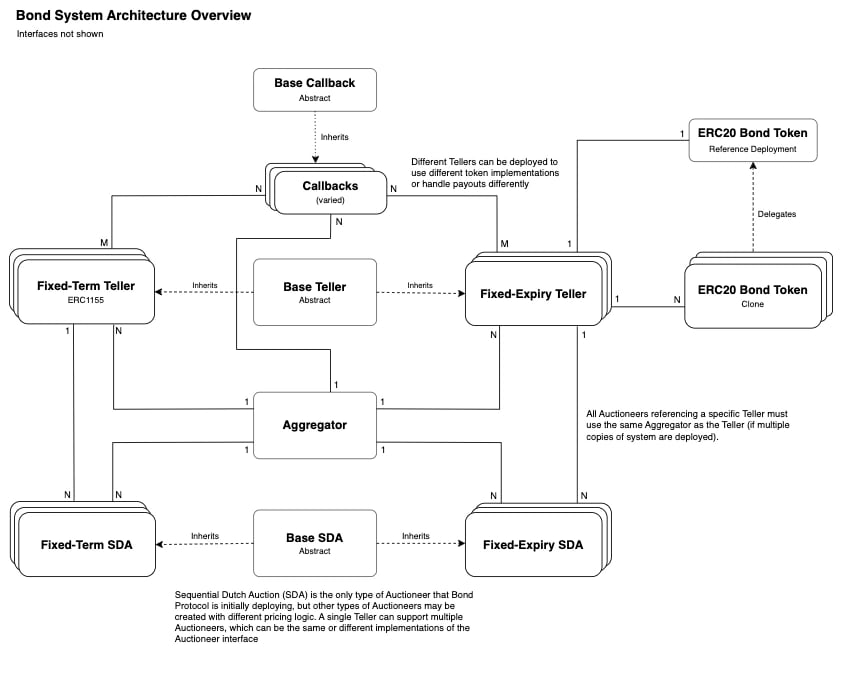위키 구독하기
Share wiki
Bookmark
Bond Protocol
0%
Bond Protocol
Bond Protocol은 모든 토큰 쌍에 대해 Olympus Pro 스타일의 채권 시장 생성을 가능하게 하는 무허가 시스템입니다. 그들의 임무는 DeFi 커뮤니티의 요구를 충족하기 위해 Bonds-as-a-Service를 제공하는 데 전적으로 집중하는 신뢰할 수 있는 중립적인 무허가 플랫폼이 되는 것입니다. [2]
개요
Bond Protocol은 Olympus DAO의 채권 서비스 성공에 따라 2022년 7월 15일에 출시되었습니다. 프로젝트는 Bond Protocol 시장을 활용하여 프로토콜 소유 유동성(POL)을 확보하고, 재무를 확장하거나, 전략적 자산을 획득합니다. 이를 통해 커뮤니티 구성원은 투명하고 공정한 방식으로 자본 요구 사항에 접근하여 대가로 귀속된 토큰을 받을 수 있습니다. Bond Protocol에서 제공하는 토큰화된 채권과 모듈식 아키텍처는 정교한 DeFi 시스템과 경매 또는 귀속된 토큰 발행에 의존하는 애플리케이션의 기반 역할을 합니다. [5][6][14]
Bond Protocol은 또한 선택적 귀속 기능을 갖춘 ERC-20 토큰 쌍에 대한 OTC(장외) 시장 생성을 가능하게 하는 스마트 계약 아키텍처를 활용합니다. 프로토콜은 자율적으로 운영되며, 시장 계약은 데이터를 저장하고 가격 책정 로직을 구현합니다. 프로토콜은 사용자 거래를 위한 텔러 계약, 시장 관리를 위한 경매인 계약, 텔러와 경매인 모두에서 데이터를 쿼리할 수 있는 애그리게이터 계약으로 구성됩니다. 이 아키텍처는 귀속 옵션을 통해 OTC 토큰 거래에서 유연성과 효율성을 제공합니다. [15]
주요 기능
Bond Protocol은 다음과 같은 다른 채권 프로토콜과 차별화되는 혁신적인 기능을 제공합니다.
- 무허가: 누구나 견적 토큰에 대한 지불 토큰을 판매하기 위해 채권 시장을 만들 수 있습니다.
- 구성 가능: 채권 구매자는 2차 시장 생성을 허용하는 자신의 포지션을 나타내는 채권 토큰(토큰화된 채권)을 받습니다.
- 모듈식: 통합된 계약 아키텍처를 통해 새로운 채권 자산과 경매 인터페이스를 시스템에 쉽게 연결할 수 있습니다. [2]
 채권 발행
채권 발행

채권 발행은 사용자가 채권 시장에서 견적 토큰이라고 하는 자산을 프로토콜에 판매할 수 있도록 하는 메커니즘입니다. 그 대가로 미래에 할인된 지불 토큰을 받습니다. 이는 사용자가 공개 시장이 아닌 프로토콜에 판매하도록 장려합니다. 채권은 할인된 가격으로 제공되지만 사용자가 빠른 이익을 위해 할인된 토큰을 한 번에 모두 판매하는 것을 방지하기 위해 귀속 기간이 있습니다. [4][5]
지속적인 더치 경매를 통한 동적 가격 책정
채권 가격은 채권의 수요와 공급에 따라 조정되는 지속적인 더치 경매를 통해 결정됩니다. 채권 가격은 수요가 높을 때 상승하고 수요가 낮을 때 하락합니다. 이 동적 가격 책정 메커니즘은 시장에서 채권 가격을 실시간으로 반영합니다. 채권 발행의 경쟁적인 특성은 참가자가 가장 큰 할인을 확보하기 위해 노력한다는 것을 의미합니다. [5]
채권 발행의 이점
프로토콜 소유 유동성(POL)
채권 발행을 통해 프로토콜은 프로토콜 소유 유동성(POL)으로 알려진 자체 유동성 준비금을 구축할 수 있습니다. POL에 충분한 깊이가 있으면 정상적인 시장 운영 및 변동성이 큰 기간 동안 사용자에게 일관된 유동성을 보장합니다. POL이 없으면 외부 유동성 공급자에만 의존하는 프로토콜은 시장 혼란 중에 유동성 부족을 경험하여 유동성 데스 스파이럴로 이어질 수 있습니다. [6]
유동성을 수익원으로 전환
POL은 유동성을 부채에서 수익원으로 전환합니다. 풀의 각 스왑 거래는 유동성 공급자(LP)에게 수수료를 발생시키며, 일반적으로 Uniswap 및 Sushiswap과 같은 플랫폼에서 0.3%에서 0.25%입니다. POL을 사용하면 유동성이 프로토콜의 재무에 영구적으로 잠기므로 이러한 수수료는 지속적인 수익 흐름이 됩니다. [6]
수익률 파밍 기회
POL은 수익률 파밍 기회를 열어줍니다. 예를 들어 프로토콜은 Sushiswap과 같은 플랫폼에 유동성 쌍을 나열하고 SUSHI 토큰 형태로 보상을 받을 수 있습니다. SLP 토큰을 Onsen 메뉴에 입금함으로써 프로토콜은 수익률 파밍 활동에 적극적으로 참여할 수 있습니다. [6]
채권 시장 참가자
발행자
발행자는 지불할 지불 토큰과 받을 견적 토큰을 정의하여 채권 시장을 만듭니다. [7][8]
사용자
사용자는 현재 시장 가격으로 견적 토큰으로 미래 날짜의 지불 토큰을 구매합니다. 그들은 시간이 지남에 따라 귀속되는 자신의 포지션을 나타내는 채권 토큰을 받습니다. 귀속 기간이 완료되면 사용자는 해당 지불 토큰에 대해 채권 토큰을 상환할 수 있습니다. [7][9]

채권 유형
고정 기간 채권
고정 기간 채권의 각 포지션은 UTC 타임스탬프를 기준으로 구매 시점부터 특정 시간이 지나면 귀속됩니다. 이러한 채권은 ERC1155 토큰으로 토큰화됩니다. [10][11]
고정 만기 채권
고정 만기 채권의 모든 구매는 특정 타임스탬프에 귀속됩니다. 이러한 채권의 귀속 기간은 Bond Protocol 프런트 엔드에 표시된 대로 최소 3일에서 최대 9개월입니다. 이러한 채권은 ERC20 토큰으로 토큰화됩니다. [10][12]
순차적 더치 경매
순차적 더치 경매는 Bond Protocol에서 사용하는 주요 메커니즘입니다. 이 경매 형식에서는 초기 가격이 높은 값으로 설정되고 입찰이 접수될 때까지 점차적으로 감소(감소)합니다. 첫 번째 입찰은 채권 판매로 이어지는
잘못된 내용이 있나요?
